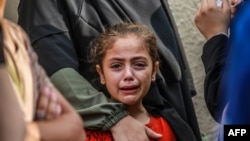Reports from Gaza on Friday indicated Israel Defense Forces continued to advance into the enclave while striking targets in the north and the south, as humanitarian efforts for the region bogged down.
Reuters news agency, citing residents and Hamas media in Rafah to the south, reported Israeli tank units entered the city’s Shakoush neighborhood, forcing thousands of displaced people there to leave their tent camps and head north to the nearby city of Khan Younis.
The Israeli military released video from what it identified as the Nahal brigade operating in the Rafah area, which showed tanks rolling through the streets and soldiers firing at targets from buildings.
Israel also reported conducting raids backed by airstrikes in northern Gaza, killing "dozens" of militants in Shijaiyah, on the edge of Gaza City, in an offensive that began late Thursday.
Meanwhile, in a humanitarian briefing Friday in Geneva, a representative from the U.N. agency for Palestinian refugees, UNRWA, told reporters that residents of Gaza were gripped by panic and desperation as fuel and humanitarian supply shortages prevented aid workers from doing their jobs.
Speaking remotely from Gaza, Senior Communications Officer Louise Wateridge described hundreds of desperate people waiting for aid trucks. She said when the few trucks that can get through arrive – carrying very little aid – “there's going to be a huge rush from the population to go and get it.”
Wateridge described nearby Rafah, which had been her base during her first tour in Gaza in May, as “destroyed.” She described much of the rest of Gaza the same way.
“I was shocked going through Khan Younis yesterday. ... Everything is rubble and yet people are living there again,” she said.
Elsewhere Friday, U.S. State Department spokesperson Mathew Miller said Secretary of State Antony Blinken met Thursday in Washington with Sigrid Kaag, U.N. senior humanitarian and reconstruction coordinator for Gaza.
Miller's statement said Blinken and Kaag discussed the need to increase and sustain humanitarian aid to Gaza, as well as ongoing work to address security challenges that have hampered the delivery of assistance inside Gaza.
Blinken emphasized the critical need to protect humanitarian workers along with the importance of reaching a cease-fire deal that would secure the release of hostages and help alleviate the suffering of civilians in Gaza, according to the statement.
The war in Gaza was triggered by last October’s Hamas attack on Israel that killed 1,200 people, according to Israeli officials, and led to the capture of about 250 hostages.
Israel's counteroffensive in Gaza has killed more than 37,700 Palestinians, according to Gaza’s Health Ministry, which does not distinguish between combatants and civilians in its count.
Some information for this report came from The Associated Press, Reuters and Agence France-Presse.






